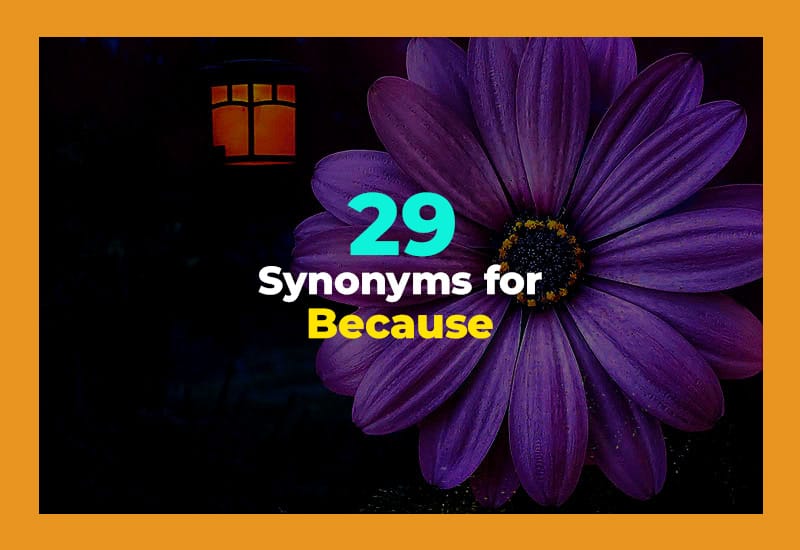You often use the word ‘because’ to explain things, right? But what if you could say the same thing in many better ways? Words like ‘as’, ‘since’, and ‘due to’ can really improve your writing. In this article, you’ll learn 29 of the best and most useful synonyms for ‘because’, with easy examples.
1. As
‘As’ is a simple and common word that can mean the same as ‘because’. We often use it to show the reason for something. It is short and easy to use. You can place it at the start or in the middle of a sentence. For example, you can say, ‘As it was raining, we stayed indoors.’ This means the reason we stayed indoors is the rain. Another example: ‘I made tea as I was feeling cold.’ It is helpful when writing or speaking in a calm and natural way. Use ‘as’ when you want to keep things short and clear without making your sentence too long or formal. It works well in both writing and speech.
2. Since
‘Since’ is another word that means ‘because’. It shows the reason for something happening. It is often used in both formal and everyday language. For example, ‘Since you are tired, you should take a rest.’ This means the reason you should rest is that you are tired. Another example is, ‘He stayed home since he was not feeling well.’ ‘Since’ helps make your sentence sound smooth and polite. You can use it at the beginning of the sentence or in the middle. It works well in writing, stories, and even in casual talks. Try using ‘since’ to make your sentences more flexible and interesting.
3. For
‘For’ is a short word that can also mean ‘because’ in certain sentences. It is often used in writing, especially in a more old-style or formal way. For example, ‘She left early, for she had a meeting.’ This means the reason she left is that she had a meeting. Another one is, ‘He smiled, for he was happy.’ Using ‘for’ instead of ‘because’ gives your writing a smooth and elegant tone. However, you should not use it in very casual speaking. It’s best for written work, stories, or formal talks. If you want your sentence to sound thoughtful or poetic, try using ‘for’.
4. Due to
‘Due to’ is a clear and formal way to say ‘because of’. It is mostly used before a noun or noun phrase. For example, ‘The flight was delayed due to bad weather.’ This means bad weather caused the delay. Another example is, ‘The school was closed due to snow.’ It is a great phrase for formal writing, reports, or when you want to sound serious. You can't use ‘due to’ in the same way as ‘because’ in every case, so be careful. Use it to describe reasons in a professional way, especially in writing.
5. Owing to
‘Owing to’ is another formal way to say ‘because of’. It is used in writing and reports. For example, ‘Owing to the heavy traffic, we were late.’ This means the traffic was the reason we were late. Another example: ‘The game was canceled owing to rain.’ It is similar to ‘due to’ and is often used in news, business, or polite writing. It gives a professional and smooth touch to your sentence. You can use ‘owing to’ to explain causes or reasons clearly, especially in emails, reports, or formal speech.
6. In view of
‘In view of’ means ‘because of’ or ‘taking into account’. It is formal and often used in business or serious writing. For example, ‘In view of the storm, the event was postponed.’ This means the storm caused the delay. Another example is, ‘In view of your experience, we offer you the position.’ This phrase helps show that something happened because of a fact or condition. Use ‘in view of’ to sound thoughtful and clear. It works well when making a decision based on facts or showing a reason behind a result.
7. On account of
‘On account of’ is a polite and formal way to say ‘because of’. It is useful in writing and speaking. For example, ‘He missed school on account of his illness.’ This means the illness was the reason he missed school. Another example: ‘The trip was canceled on account of rain.’ This phrase adds a little more weight than just saying ‘because’. It's often used in stories, news, and formal talks. Use ‘on account of’ when you want to explain something carefully and politely.
8. Seeing that
‘Seeing that’ means ‘since’ or ‘because’ and is often used in casual or spoken English. For example, ‘Seeing that you’re already here, let’s begin.’ This means the reason for starting is that you are here. Another example: ‘We decided to stay in, seeing that it was getting dark.’ It is great for explaining your choice or action in a simple and friendly way. It gives your sentence a smooth flow and can make your reason sound more thoughtful. Use it when speaking with friends or writing in a relaxed tone.
9. Considering
‘Considering’ is a word that shows you are thinking about a reason or fact. It is often used in both writing and speaking. For example, ‘Considering his age, he is very active.’ This means his age is the reason it’s surprising that he is so active. Another example: ‘We did well, considering the time we had.’ It helps show that a reason or condition is part of your thinking. You can use it to explain results, actions, or opinions. It is short and easy to use in many situations.
10. For the reason that
‘For the reason that’ is a longer phrase that clearly explains why something happened. For example, ‘She refused the offer for the reason that it was not fair.’ This means the unfairness was the reason she said no. Another example: ‘He was upset for the reason that he was left out.’ It is often used in writing to be very clear. Though longer, it gives a strong and clear reason. You can use it when you want to explain your thoughts in detail or make your writing more formal.
11. As a result of
‘As a result of’ means ‘because of something’. It shows what caused a certain outcome. For example, ‘As a result of the storm, the power went out.’ This means the storm caused the power loss. Another example is, ‘As a result of his hard work, he passed the test.’ This phrase is great for writing and speaking. It helps make your message strong and clear. It is useful in reports, essays, and even speeches. Use it when you want to show a direct link between a reason and a result.
12. By reason of
‘By reason of’ is a formal phrase that means ‘because of’. For example, ‘He was excused by reason of illness.’ This means his illness was the reason he was excused. Another example: ‘By reason of her kindness, she was loved by many.’ It is mostly used in legal or formal writing. It makes your sentence sound more official. While it may not be common in daily speech, it is good for business or legal texts where you want to explain a cause clearly.
13. Inasmuch as
‘Inasmuch as’ is a formal phrase that means ‘because’ or ‘since’. It is not often used in casual talks, but it can be useful in writing. For example, ‘He is lucky, inasmuch as he has a caring family.’ This means he is lucky because he has support. Another example: ‘Inasmuch as the plan has failed, we need a new one.’ It adds a thoughtful tone and works well in essays or reports. Use it when you want to sound formal or academic.
14. Given that
‘Given that’ means ‘because’ or ‘since’. It helps to show a reason clearly. For example, ‘Given that it is late, we should go home.’ This means the reason for leaving is that it's late. Another example: ‘Given that you are new, we will help you.’ It is friendly and useful in both writing and speech. It makes your sentence more polite and thoughtful. Use it to explain reasons in a kind and smooth way, especially when talking to someone directly.
15. In light of
‘In light of’ means ‘because of’ or ‘considering’. For example, ‘In light of recent events, the rules have changed.’ This means the recent events caused the change. Another example: ‘In light of his progress, he was promoted.’ It is good for writing, business, and news. It shows that something has changed or happened because of some facts. Use it when you want to explain a result that follows something new or important.
16. Thanks to
‘Thanks to’ means something good or bad happened because of someone or something. For example, ‘Thanks to her help, we finished early.’ This means her help was the reason for finishing early. Another example: ‘Thanks to the rain, the match was canceled.’ It is friendly and works in both speaking and writing. It can be used for both good and bad outcomes. It gives a warm, thankful tone to your sentence. Use it when you want to express cause with feeling.
17. Through
‘Through’ can also mean ‘because of’ in some situations. For example, ‘He succeeded through hard work.’ This means his success came because he worked hard. Another example: ‘She improved through practice.’ It shows the way something happened. ‘Through’ can be used to show the method or reason behind a result. It is short and useful in both formal and casual speech. Try using it to show cause or reason in a more active way.
18. Being that
‘Being that’ is a casual way to say ‘because’. For example, ‘Being that it's raining, let's stay inside.’ This means the rain is the reason to stay in. Another example: ‘Being that you are tired, you should rest.’ It's often used in conversation but not in formal writing. It makes your tone relaxed and easygoing. Use it when talking with friends or writing in a friendly style. Avoid it in formal or academic settings.
19. As long as
‘As long as’ can mean ‘because’ when it explains a reason or condition. For example, ‘As long as you're here, help me out.’ This means the reason to help is that you are already present. Another one: ‘You can go out as long as you finish your work.’ It is helpful for showing reasons and rules. It works well in speaking and friendly writing. Use it to explain choices and conditions.
20. Now that
‘Now that’ means ‘because something has happened’. For example, ‘Now that we're ready, let's begin.’ This means being ready is the reason to start. Another example: ‘Now that it's morning, we can go outside.’ It shows a change in time or situation that causes something. It is friendly and common in speaking. Use it when talking about something new that changes what you do next.
21. For the sake of
‘For the sake of’ means ‘because of’ or ‘to help’. For example, ‘He changed his job for the sake of his health.’ This means health was the reason for the change. Another: ‘She stayed quiet for the sake of peace.’ It shows doing something to help someone or something. Use it in writing and speaking when you want to show care or purpose.
22. On the grounds that
‘On the grounds that’ means ‘for the reason that’. For example, ‘She was fired on the grounds that she broke the rules.’ This means breaking the rules was the reason. Another: ‘The request was denied on the grounds that it was late.’ It is formal and used in reports or legal writing. Use it to show a strong reason behind a decision.
23. In that
‘In that’ means ‘because’ or ‘since’. For example, ‘He is lucky in that he has great friends.’ It shows a reason in a special part of the sentence. Another: ‘She is right in that she asked for help early.’ It is often used in writing and thoughtful speech. Use it when you want to highlight the part that explains why.
24. Seeing as
‘Seeing as’ means ‘because’ or ‘since’. For example, ‘Seeing as you're here, let's start.’ It's friendly and easy to use. Another example: ‘Seeing as we're both free, want to go out?’ It is common in casual talk. Use it when you want to sound warm and natural.
25. Wherefore
‘Wherefore’ is an old word that means ‘because’. It is rarely used today but appears in older texts. For example, ‘He was late, wherefore the meeting was delayed.’ It sounds poetic and formal. Use it in writing only when you want an old-fashioned or dramatic tone.
26. In consequence of
‘In consequence of’ means ‘as a result of’. For example, ‘In consequence of the storm, school was canceled.’ It is formal and used in writing. Another: ‘He left, in consequence of the news.’ Use it in reports or letters to show reason clearly.
27. In respect of
‘In respect of’ can mean ‘because of’ in some cases. For example, ‘In respect of your efforts, we offer a reward.’ It is formal and polite. Use it in business writing or official letters.
28. In so far as
‘In so far as’ means ‘to the extent that’. For example, ‘He helped, in so far as he could.’ It shows reason and limit. It is useful in formal writing or thoughtful discussion.
29. Due to the fact that
‘Due to the fact that’ is a long version of ‘because’. For example, ‘He stayed home due to the fact that he was ill.’ It is clear and formal. Use it when you want to sound exact.

Final Thoughts
Learning more ways to say ‘because’ helps you speak and write better. These 29 useful words and phrases will help you explain things more clearly and in different styles. Whether you’re writing a report, telling a story, or just having a conversation, these synonyms give you many new ways to express yourself. Try using them in your daily writing or talking, and see how your language improves. Choosing the right word makes your message stronger, clearer, and more natural.









